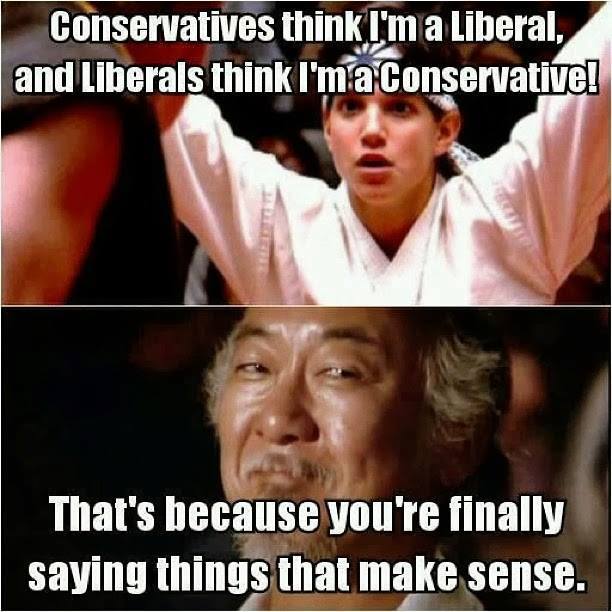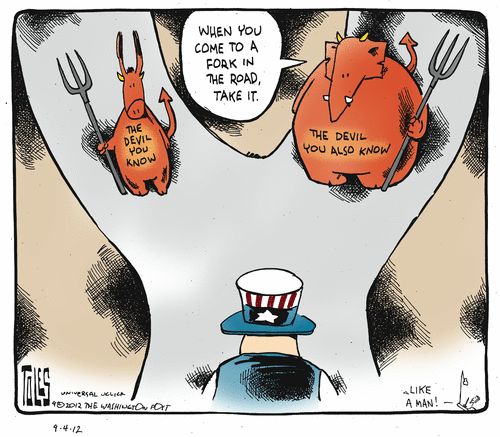10 Ways You Know You're an Independent Voter

1. Conservatives think you're liberal, and liberals think you're conservative.
When you have discussions with your friends or people online about politics, you get accused by hyper-partisan conservatives of being a radical left winger, and later that same week a hyper-partisan liberal accuses you of being alt-right. You laugh to yourself because you know you're neither one of those things, but somewhere in the middle, or that you see the nuances well enough to align differently on an issue-by-issue basis without having to march in lockstep with an accepted partisan creed.

2. You start to notice the eerie ways both parties are actually very similar.
After seeing the White House and each house of Congress flip back and forth between the two parties enough times, you notice that the real differences between the two parties aren't their branded differentiation rhetoric for the voters on the campaign trail, that there isn't really a Democratic Party that has a certain point of view and a Republican Party that has a certain point of view, but a party that's in power and a party that's out of power. You notice the party in power starts to let its principles slip while the party out of power is suddenly the conscience of the nation.
3. Third party and independent candidates start to sound a lot more reasonable.
Although they're painted as extreme, out of touch, or quirky, you start to think maybe we should give one of these third party candidates a chance at policy making or executive administration, that the things some of them say actually make a lot of sense and are very perceptive about government, economics, and society. You get the feeling too that they are rather sincere and really mean it when they explain their ideas and principles.
4. Campaign ads look and sound more and more ridiculous as time goes on.
Whereas before when you were a partisan voter, the music, the slogans, the patriotic rhetoric stirred the blood and made you feel something, the sense of a climactic battle between good and evil for the future of the country at stake. Now the ads just come off as so incredibly fake and in such bad taste.
5. You start actually doing the research on candidates before voting.
Instead of knowing who you'll vote for in advance because they're an (R) or a (D), you actually do some looking into the past statements and voting history of candidates. You check out OpenSecrets to see where their donations are coming from. You read their Wikipedia page and their voting record and learn about everything they've done. Some of what you find may even surprise you when you thought you knew what a politician stood for.
6. You realize how unfair the electoral system is to independent candidates.
It boggles your mind just how tailor-made for the Republican and Democratic Parties (which are not mentioned or included anywhere in the Constitution) the political process is, and how rigged the voting and ballot requirements are against independent and third party candidates. It all seems incredibly undemocratic and unconstitutional, and designed to keep the same people and groups in power, unchecked by the conscience of the voters.
7. There's often not a candidate in a race that you feel represents you.
Both of the two options offered in many races seem woefully inadequate to the position of power they're running for, and you've become increasingly less satisfied with settling for the "lesser of two evils," especially as both parties degenerate into more extreme and unacceptable caricatures of their worst aspects. You wish there were more independent and third party candidates, and that more people would consider them viable options.

8. You stop watching cable news and listening to talk radio.
It's all so biased and partisan one way or another, and you just can't stomach anymore of it. You also don't think it's dramatic and interesting anymore when the guests and panelists aggressively talk over each other without even listening to each other. You feel it make your blood pressure rise and your head hurt. It's obviously not a discussion, just a loud, incredibly grating argument between two grown adults on live television.
9. You seek out more information from alternative media online.
To clear things up and really try to understand what's going on in this country and the world, you join the conversation online, and dig deeper into different issues that matter to you, trying to understand the complexity and nuances behind them better. You're more motivated by sincere curiosity than the initially rewarding excitement of a fight that has with time turned sour and feels as unproductive as it really is.
10. You officially leave the parties and register unaffiliated.
It feels good to join the growing movement of unaffiliated voters, and help that number to swell, showing others that it's safe and smart for them to leave the Democratic and Republican Parties too and be their own individual party of one.
Photo Credit: Joe Belanger / shutterstock.com



